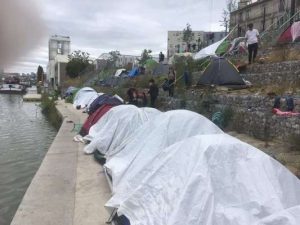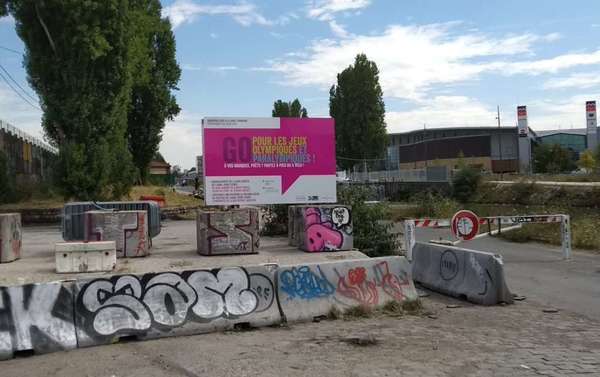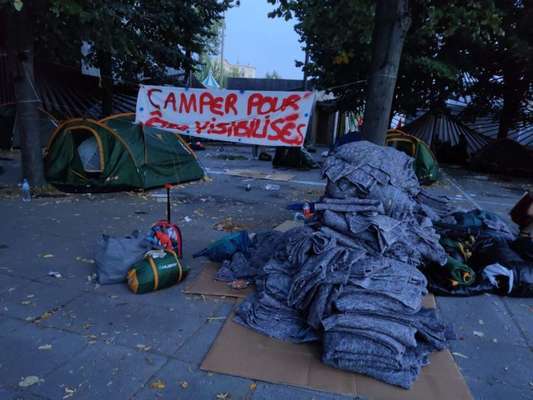 This Wednesday, July 29th, the camp of the Saint-Denis canal in Aubervilliers should be dismantled by the authorities announced associations helping migrants. The camp welcomes more than 1200 people in extremely precarious conditions. An eviction which is nothing new, the “sheltering” or “evacuations”, in the words of the authorities, is repeated tirelessly in France. A problem that the authorities refuse to tackle.
This Wednesday, July 29th, the camp of the Saint-Denis canal in Aubervilliers should be dismantled by the authorities announced associations helping migrants. The camp welcomes more than 1200 people in extremely precarious conditions. An eviction which is nothing new, the “sheltering” or “evacuations”, in the words of the authorities, is repeated tirelessly in France. A problem that the authorities refuse to tackle.
Between Aubervilliers and Saint Denis, along the canal, Brahim comes out of his tent crushed by the sun. He explains that he has been there for 3 months, with his wife and his newborn baby. Like the others, he lines up in spite of the heat to get antibacterial hand gel, masks, T-shirts and a bit of shampoo. An aid distributed by the association Utopia 56, Brahim, desperate, searches the five boxes of old clothes lying on the quayside: “this place is not possible for my child” he explains, “it’s just not possible. Is this Europe? France is like Africa?! My life is shattered. “The rule: one health kit, one T-shirt, one pair of pants per person, no more. Everyone has to be able to help themselves. In the end, nearly 150 people take advantage of the distribution, but soon the stocks leave. There are only too big pants left.
“Two fountains and six toilets” for 1200 people
Before the confinement, nearly 400 people “lived” in this camp. Since mid-May, the population has tripled, according to the associations. From the road to the edge of the canal, the tents are glued together, sometimes on sloping ground. They stretch along the water, making the camp particularly dangerous. Kabella Doni-Neckson, a 29-year-old Sudanese boy, drowned a few days ago. Here, “it smells like piss, literally. “It’s dirty, it’s polluted, there’s noise. A little further on, the machines on the construction site for the extension of line 12 of the subway are noisily moving. The cars pass in numbers on the bridge over the camp. It’s almost impossible to have a moment’s peace and quiet.
“For many, there are two cars per tent; some don’t have tents. There are two fountains and six toilets, which is unsatisfactory considering the number of people. ” says Pierre Jothy. He’s volunteering for civic service at Utopia 56.” With the summer, there are issues about access to water, or just having a place to just be comfortable. In the middle of the day, in tents in the sun, it’s a horror. »
“New people arrive every day”
“Most of them are Afghan, Somali or Sudanese,” says Pierre. “New people are arriving every day,” he worries. The rapid increase in the camp’s population “is probably the effect of the reopening of intra-European borders or evictions following the end of the winter break. “During the confinement, the associations and institutions that were supposed to deal with the situation have closed down or slowed down. On the administrative side: the filing of asylum applications is difficult to restart, especially with the arrival of the summer holidays.

A few meters from the camp, a sign announces the work planned for the organization of the 2024 Olympic Games in Saint-Denis. Photograph: Léonardo Carota for Utopia 56.
“I went to Italy, then Switzerland, after Germany, and finally Belgium and France,” says Samuel. He was born in 1995 and is a former member of the Porte de la Chapelle camp who was evicted in November 2019. Like many, his journey is symptomatic of the consequences of the Dublin settlement. A European agreement which implies that the asylum application must be lodged in the EU country where the migrants were first checked.
“Between 200,000 and 300,000 people are estimated to be wandering around Europe. “They are left abandoned or enter illegally and we find them months later, broken by the street and sometimes with serious psychiatric problems,” said Pierre Henry, director-general of France Terre d’Asile. “Insecurity also weighs on the camp. Tensions that add to the precarious living conditions. Samuel warns, “here during the day, it’s fine, but at night… there’s shouting and fighting.”
When discussing the risks of a possible second wave of COVID-19, the subject seems almost peripheral to Pierre Henry. “There are many other problems, with the return of tuberculosis or the presence of scabies. In any case, here the slightest little bump can become dramatic.”
In the face of “undignified” conditions, a “safe” response only
“Local and regional authorities, the State and associations need to sit around a table and build another model,” says Pierre Henry, “it’s possible and it won’t cost us any more. “The Director General of France Terre d’Asile advocates dignified and unconditional reception conditions, at least for the time it takes to process asylum applications. Administrative acts that often take at least a year and a half, sometimes much longer. He also points out one of the absurdities of the situation: “the regular emergency evacuations are colossal in terms of budget. When you mobilize a hundred police officers to supervise the evacuation, what budget do you get for that? »
A concern shared by Utopia 56 volunteers like Ophelia. While in Paris, she is used to the Calais camp in the north of France. While in Paris, she gives a hand to her Parisian colleagues by participating in the distribution. “In Calais, people are evicted very regularly. It’s expensive. For the same amount of money, we could build two or three emergency accommodation centres. I think it’s a lack of will on the part of the public authorities. People are being evicted but they come back, because they are not offered solutions or they are offered absurd solutions. »
In Paris: “If you pass the ring road, the media won’t pass it”
Pierre Jothy adds, “What we are questioning is that there is a lack of public service for these people. The only representatives of the state they see is the police, which shows that we are mainly in the security response rather than in the reception. “His volunteer colleague Shirish associates this problem with that of visibility.” Before, most of the camps were in Paris. When we were evicted from Porte de la Chapelle last November, we were told very explicitly that as long as they weren’t inside the capital, it was okay. »

Already in August 2019, the so-called “Millennium” camp, in reference to the shopping centre located near by the Canal Saint Denis, had been evicted by the authorities. Photograph: Léo Lefrançois for Radio Parleur
From his office, Pierre Henry of France Terre d’Asile completes the reflection: “If you pass the ring road, the media and even some activists do not pass it. People are much more interested in what happens inside Paris. We are told the slum inside the city, we don’t want it. At that moment, we have to tell people where they have the right to go ! »
Since taking office, the new mayor of Aubervilliers, Karine Franclet (UDI), has regularly called for an evacuation. This should take place this Wednesday, July 29, very early in the morning. Gymnasiums have already been requisitioned for emergency accommodation. Once again, this is a temporary solution and a new camp may be formed later, on the banks of the Saint-Denis canal or elsewhere, where the suffering of the exiled in Paris and elsewhere will still be ignored.
Refugees related groups in France https://radar.squat.net/en/groups/country/FR/topic/sans-papiers
Some squats in France: https://radar.squat.net/en/groups/country/FR/squated/squat
Groups (collectives, social centres, squats) in France: https://radar.squat.net/en/groups/country/FR
Events in France: https://radar.squat.net/en/events/country/FR
Radio Parleur https://radioparleur.net/2020/07/28/migration-camp-aubervilliers-expulsion/
